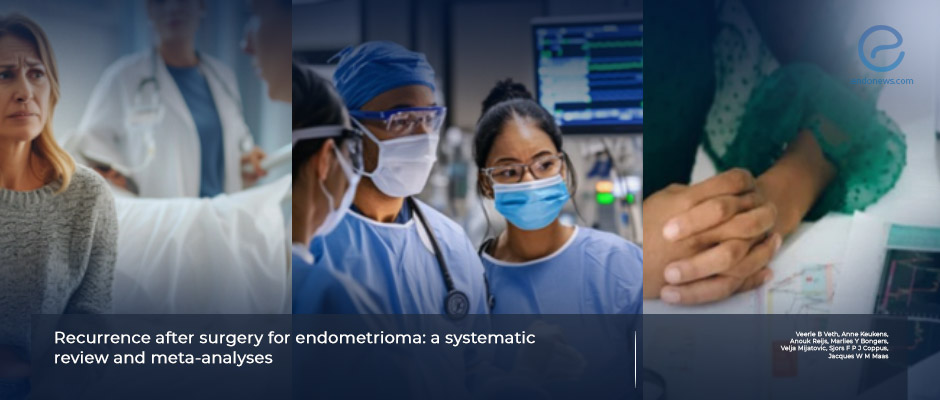Post Surgery Endometrioma Recurrence
Sep 12, 2024
The recurrence rate of women with endometrioma who did not get postoperative hormonal therapy was studied.
Key Points
Importance:
- While postoperative hormonal treatment is recognized for its effectiveness in preventing endometrioma recurrence, it is not always accepted or well-tolerated by patients.
Highlights:
- Without postoperative hormonal therapy, the recurrence rate of endometrioma reaches up to 27% within 24 months following surgery.
What's done here:
- This comprehensive literature review by Veth et al. from the Netherlands analyses studies on women with ovarian endometrioma who received surgical treatment without postoperative hormonal therapy. Following PRISMA guidelines, the review used electronic databases to evaluate the recurrence rate of endometrioma after surgery.
- The review encompassed surgical techniques such as laparoscopy, laparotomic cystectomy, laser or plasma energy vaporization, and electrocoagulation ablation, excluding studies that focused on endometrioma drainage. It only included randomized controlled trials, prospective cohort studies, and retrospective studies, while case reports were excluded.
- No distinction was made between asymptomatic and symptomatic women, and the presence of deep endometriosis alongside endometriomas was not addressed.
- Two authors independently reviewed all articles to determine inclusion and exclusion criteria. They used a data extraction form to gather information on study design, outcome measures, and reported treatment options from eligible articles.
Key Results:
- Literature search identified 5,695 records, with 55 meeting the inclusion criteria for this meta-analysis: these included 12 retrospective & 11 prospective cohort studies, and 32 retrospective studies.
- Data from 1,024 patients across 23 cohort studies showed endometrioma recurrence rates of 4%, 14%, 17%, and 27% at 3, 6, 12, and 24 months, respectively.
Lay Summary
Postoperative hormonal suppression of endometriosis helps alleviate pain, including pelvic pain, dysmenorrhea, and dyspareunia, after 12 months. Additionally, literature indicates that hormonal treatment can reduce the endometrioma recurrence rate from 6-14% to 25% within 24 months of surgery.
Veth et al. from the Department of Obstetrics and Gynecology at Maastricht University Medical Center, Netherlands, aimed to determine the postoperative recurrence rate of endometrioma without hormonal suppression therapy. To achieve this, they conducted a comprehensive literature review focusing on prospective and retrospective cohort studies, as well as randomized controlled trials.
Data from twenty-three studies that met the criteria were pooled for meta-analysis. These studies included follow-ups at 3, 6, 12, and 24 months to assess endometrioma recurrence rates without postoperative hormonal treatment. The recurrence rates for these periods were 4%, 14%, 17%, and 27%, respectively. Only one study confirmed recurrence through second-look laparoscopy, while two studies did not specify their diagnostic methods. The remaining studies used ultrasonographic examination to verify endometrioma recurrence.
Research Source: https://pubmed.ncbi.nlm.nih.gov/39098538/
ovarian endometriosis recurrence meta-analyses surgery postoperative hormonal treatment endometriosis.

